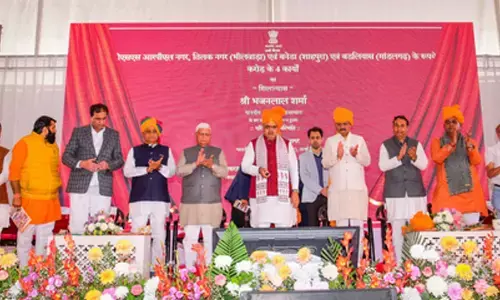Manipuri folk singer collaborates with Portuguese group for a social cause

Manipuri folk singer Mangka has joined hands with Portuguese group Cla for a song, proceeds from which are being donated to a foundation that helps carry out wishes of children with degenerative diseases.
New Delhi: Manipuri folk singer Mangka has joined hands with Portuguese group Cla for a song, proceeds from which are being donated to a foundation that helps carry out wishes of children with degenerative diseases.
The song, titled "Nura pakhang" (Eu E Tu), is part of T(H)REE, a cultural project that joins musicians from Portugal and several Asian countries, in unique musical partnerships.
The track has two different versions; one is of almost seven minutes, the other one is the radio edit version "The song was launched in April. It is played on radio in Portugal and is available on the internet. But I will be able to distribute it after June. I never thought of earning a profit from this project.
All the proceeds will go to Make a Wish Foundation," Mangka told IANS over phone from Manipur's capital Imphal. Asked about the song's distribution plans, she said she is yet to think about it. "Some channels, including from Delhi, have approached me to air it. But let's see," she said.
The performer of the Manipur-based Laihui Ensemble has teamed up with international artistes like Japan's shakuhachi player Hiromu Motonaga, cello player Nawa from Hawaii and dancer Leah from New York.
So, was it easy for the 20-year-old, who has feet firmly rooted in Manipuri culture, to bag an opportunity to collaborate with Cla, considered to be one of the best Portuguese bands? "David Valentim is a Portuguese producer. How he spotted me... even I am unaware.
He wrote a mail to me once about the project. He said it's a non-profit project, and without meeting each other, we can create a song." "My father (Manipuri folk musician Mayanglambam Mangangsana) wrote and composed 'Nura pakhang', which is a love song, and sent it to David via mail.
I haven't met any one of them. The video, which was shot in Manipur and Portugal, has been made by Romi Meitei. He met Cla," said Mangka. The artistes couldn't record together. But that doesn't mean that there is no possibility of them touring together.
"David is trying hard to arrange a live performance. I would definitely like to do it. The venue and date are yet to be decided," said the Manipur born and bred artiste. If all goes well, she might just work with artistes from Cambodia and Myanmar. What about collaborations with local talent? "Being a playback singer in Bollywood is not what I have in mind.
I don't like the idea of me singing a song and someone else acting on it. I think all traditional folk music artistes should sing and perform. "Traditional singers will be able to emote better than actors," says Mangka, who sings and features in the videos sporting traditional attire. "Also, the thing is... in Manipur, you can't sing in Hindi. If they want me to sing, I can do so in my own language.
But singing in Hindi would be a little uncomfortable for me," said the English Honours graduate. She does, however, believe that language is no barrier. "Music is a universal language, still each and every place has its own culture. It's best to follow our culture," said the singer.
She wears Manipuri culture on her sleeve, but the same can't be said about most youngsters in the northeastern state where one can easily spot the strong influence of rock music. "My friends would always tease me for learning 'old ladies' songs as most people are either crazy about Manipuri film songs or rock music. Those comments used to make me feel embarrassed.
"After a while, my songs started airing on local radio stations. This was followed by public performances, and then people started appreciating them. It made me happy. It's rare to see people of my age learning this. But I always thought about bringing a change and so, focused on folk music," said Mangka.
By Natalia Ningthoujam
















